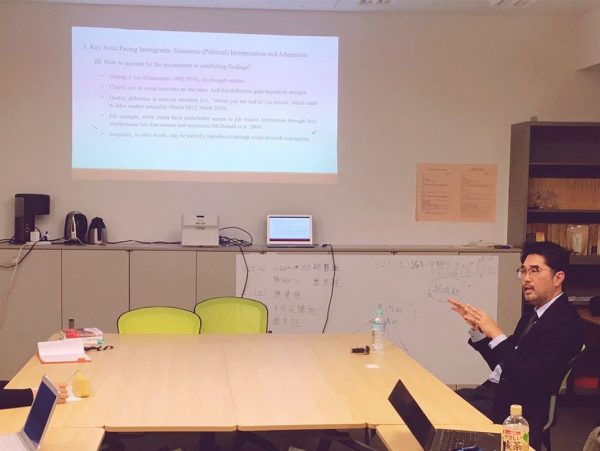[Workshop] “Doubly Disadvantaged? Gender, Informal Job Search, and Labor Market Outcomes among South Korea’s Immigrant Workers”
On November 26th, 2018, Waseda University’s Global Asia Research Center hosted a workshop entitled “Doubly Disadvantaged? Gender, Informal Job Search, and Labor Market Outcomes among South Korea’s Immigrant Workers.” Harris Hyun-soo Kim, the Professor of Sociology at Ewha Womans University presented on current issues involving the immigrant labor market and labor migration in South Korea.
Korea has become a popular destination to migrate from the underdeveloped countries in Asia, and, thus, it is becoming a multiethnic nation. Due to extreme demographic changes in Korea, for example, low marriage/fertility rates and a shortage of labor forces, there is an increasing demand for foreign workers as well as foreign wives. Prof. Kim explained how the immigrants in Korea tried to find jobs and why the jobs mattered. The foreign workers or migrants in Korea rely on informal networks of traditional job hunting, also known as referrals. Prof. Kim pointed out that the migrants tended to emphasize the principle of homophily regarding job searches. However, the native population networks provide more advantages in practical job searches than the co-ethnic networks in their host country.
Prof. Kim also explained the gender effect in Korean’s immigration population. Overall, marriage migration in Korea has gradually increased. To explain the phenomenon, he used the hierarchical linear model and fixed approaches to substantiate his empirical research.
After the presentation, a lively discussion went on, with Prof. Kim mentioning cases of Korean American businesses in Los Angeles for the comparative perspective of migration. Other participants linked this topic to the cases of Japanese Americans, especially how they integrated into American society. Additionally, there was discussion on how both Korea and Japan have faced difficulties in reforming immigration policy and supporting multicultural households.
Prof. Kim’s research reveals the fact that informal job searches affect immigrants’ economic livelihood, especially in the case of immigrant men. In general, racial or ethnic minorities suffer from a lack of social capital in the receiving country. He also pointed out that more research should be done to examine why, how, and when ethnic networks and social capital promote or hinder (gendered) immigrant adaptation. The workshop provided a meaningful opportunity to bring up the issues of labor migration arising in South Korea which can represent a common denominator of other migrant receiving countries in Northeast Asia.

